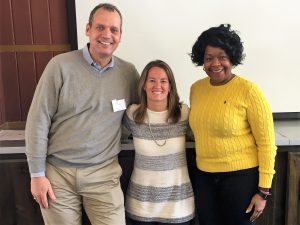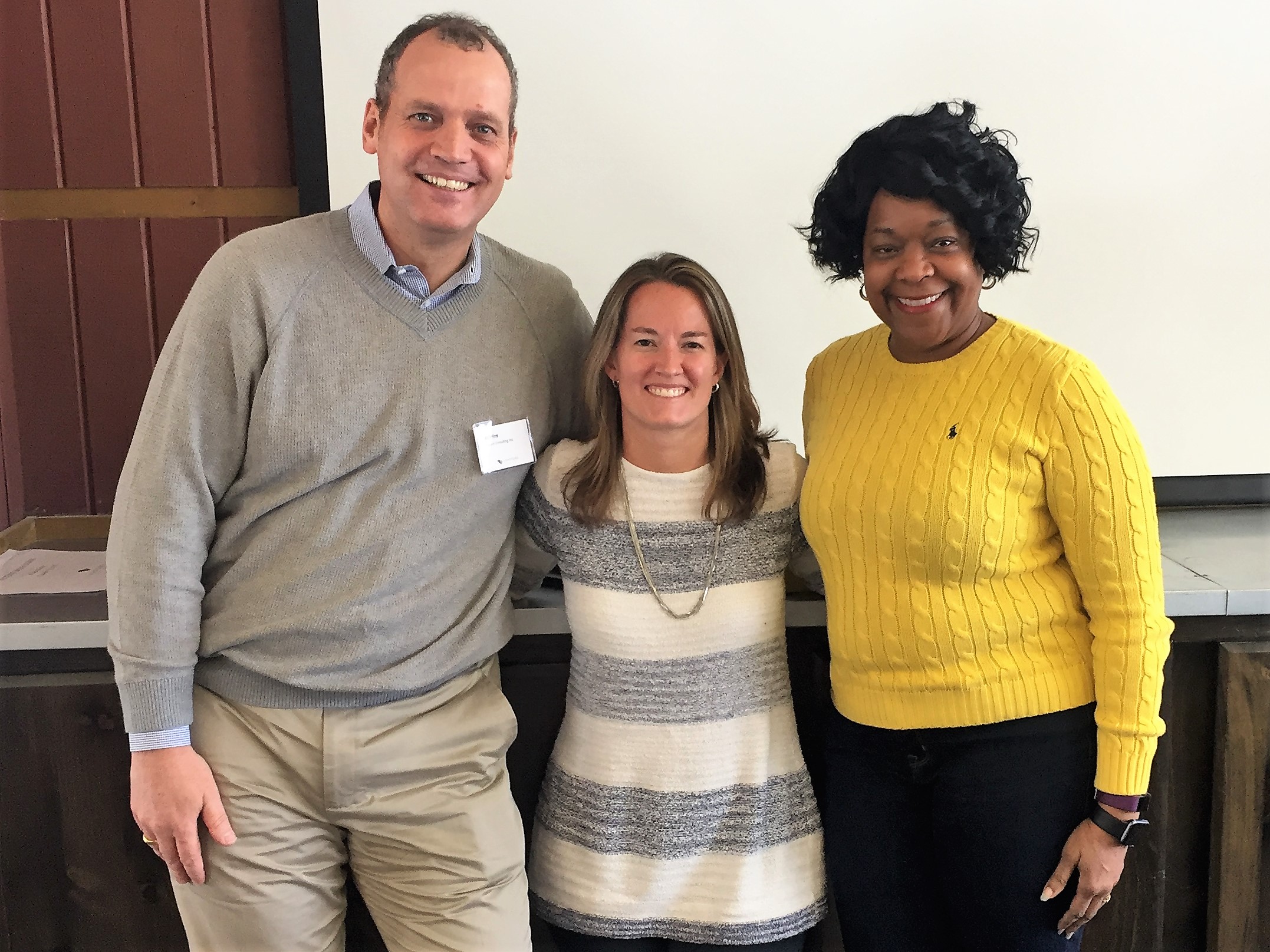Keystone Energy Board Members Work to Rebuild a Resilient Grid in Puerto Rico
Puerto Rico’s already struggling, $9 billion-in-debt power grid was severely damaged by Hurricanes Irma and Maria in September 2017. Keystone Energy Board member organizations Smart Electric Power Alliance (SEPA), CPS Energy, and Navigant, along with other mainland energy utilities, associations, government agencies, consultants, elected officials, and other leaders, are supporting the efforts to rebuild the island’s electric system.

Under the leadership of a Steering Committee that included Hamm, a Puerto Rico Energy Resilience Working Group prepared the Build Back Better report, which analyzed the storm damage to the Puerto Rican power system and provided rebuild recommendations to the Puerto Rico Electric Power Authority (PREPA), the Puerto Rico governor’s office, the Federal Emergency Management Agency, and other stakeholders. Hamm is also a member of PREPA’s Transformation Advisory Council (TAC), which was formed to provide PREPA’s leadership with guidance as the grid is rebuilt and strengthened. The TAC is co-led by David Owens, a former Energy Board member who recently retired as Executive Vice President of the Edison Electric Institute, and Dr. Cris Eugster, Gold-Williams’ colleague and Chief Operating Office at CPS Energy.
The TAC and PREPA face a daunting task. Hundreds of thousands of Puerto Ricans remain without power, and Hamm explained that there’s a conundrum in the tension between “getting the power back on as fast as possible and the desire to use this opportunity to transform the system.” Vrins of Navigant, which led the development of the Build Back Better report, echoed Hamm’s remarks and emphasized the need to balance between putting existing assets to good use and building new electric infrastructure. Essential, too, is ensuring the successful restoration of power to the island’s manufacturing facilities — which support a manufacturing industry that makes up nearly half of Puerto Rico’s GDP.
Gold-Williams, who runs the country’s largest municipally owned utility providing both natural gas and electric service, fully understood the challenges that PREPA, a fellow member of the Large Public Power Council, faces. Gold-Williams has overseen CPS Energy’s other post-hurricane relief efforts in Texas and Florida, and she emphasized that “Puerto Rico has a difficult set of issues to conquer — logistically, financially, politically, and technically — all the while they will soon be facing a new hurricane season. Even so, I feel confident that the rebuilding of Puerto Rico will ultimately be a successful effort, and that it is the perfect place to be creative and innovative with new and improved solutions.”
With 2017 marking the most expensive year for natural disasters in the United States, Energy Board members expressed their concerns that these challenges are not and will not be unique to Puerto Rico. “These disasters are going to keep happening,” Vrins noted. “Putting the wires back up over and over again is not the answer.”
Amidst these challenges, Hamm is hopeful for the island of Puerto Rico, where most stakeholders share a common vision for rebuilding and strengthening an electric grid that is customer-centric, safe, reliable, and an economic engine for the island. Organizations like SEPA, CPS Energy, Navigant, and others remain committed to supporting PREPA and the American citizens of Puerto Rico through this transition — exactly the kind of collaboration among diverse experts that Keystone champions with its Energy Board and energy and climate project work.
Through the Energy Board, which meets again on June 5 in Washington, D.C., Keystone will continue to provide a forum to discuss problems of this magnitude and complexity. With 50 members representing different perspectives on energy and climate policy from the industry, technology, environment, consumer advocacy, and state and federal government arenas, the Energy Board facilitates the dynamic, candid, and in-depth conversations needed to tackle the energy sector’s most pressing challenges.
Check back here to learn more about what the Energy Board will be discussing throughout the year — and for more information on Keystone’s emerging project work, particularly as it relates to how communities large and small are innovating and incorporating technology into their energy systems to become more efficient, sustainable, and resilient.


 Effective March 1, 2025, Thomas J. Vilsack, former United States Secretary of Agriculture and Governor of Iowa, became the first Chief Executive Officer for the World Food Prize Foundation. In this new role, Governor Vilsack is focusing on expanding the Foundation’s global network, and will further position the Foundation as a leader in addressing global food and nutrition insecurity, continuing his lifetime of public service.
Effective March 1, 2025, Thomas J. Vilsack, former United States Secretary of Agriculture and Governor of Iowa, became the first Chief Executive Officer for the World Food Prize Foundation. In this new role, Governor Vilsack is focusing on expanding the Foundation’s global network, and will further position the Foundation as a leader in addressing global food and nutrition insecurity, continuing his lifetime of public service. Shelby Coffey III is a distinguished journalist, media executive, and thought leader whose career has helped shape the landscape of American news and public discourse. Over several decades, Coffey has held some of the most influential roles in journalism, including serving as editor of the Los Angeles Times, executive vice president of ABC News, and deputy managing editor of The Washington Post. His editorial leadership extended to key roles as president of CNN Financial News, editor of the Dallas Times Herald, and U.S. News & World Report.
Shelby Coffey III is a distinguished journalist, media executive, and thought leader whose career has helped shape the landscape of American news and public discourse. Over several decades, Coffey has held some of the most influential roles in journalism, including serving as editor of the Los Angeles Times, executive vice president of ABC News, and deputy managing editor of The Washington Post. His editorial leadership extended to key roles as president of CNN Financial News, editor of the Dallas Times Herald, and U.S. News & World Report. Jerry Steiner has spent 40 years involved in agriculture following growing up on a Wisconsin dairy farm. He began his career with Monsanto, in multiple business leadership roles. From 2003-2013 he served as a member of the Executive team, as the company’s Executive Vice President of Sustainability and Corporate Affairs. He led the company’s global Government, Public and Industry Affairs teams across the 70 countries where Monsanto conducts business. This experience got Jerry connected to the Keystones centers work in agriculture. Key among his responsibilities were shaping the company’s public policy and building partnerships aimed at helping farmers around the world produce more food, while conserving valuable resources like water and energy. Two unique partnership that developed under his leadership were drought tolerant corn with 5 African countries, CIMMYT and the Gates foundation, and a building a sustainable business model in Brazil with the value chain leading to significant multi-company investment and soybean varieties that can protected themselves.
Jerry Steiner has spent 40 years involved in agriculture following growing up on a Wisconsin dairy farm. He began his career with Monsanto, in multiple business leadership roles. From 2003-2013 he served as a member of the Executive team, as the company’s Executive Vice President of Sustainability and Corporate Affairs. He led the company’s global Government, Public and Industry Affairs teams across the 70 countries where Monsanto conducts business. This experience got Jerry connected to the Keystones centers work in agriculture. Key among his responsibilities were shaping the company’s public policy and building partnerships aimed at helping farmers around the world produce more food, while conserving valuable resources like water and energy. Two unique partnership that developed under his leadership were drought tolerant corn with 5 African countries, CIMMYT and the Gates foundation, and a building a sustainable business model in Brazil with the value chain leading to significant multi-company investment and soybean varieties that can protected themselves. Jennifer Morris is the Chief Executive Officer of The Nature Conservancy, leading a team of nearly 6,000 staff working in more than 80 countries and territories tackling the dual crises of the
Jennifer Morris is the Chief Executive Officer of The Nature Conservancy, leading a team of nearly 6,000 staff working in more than 80 countries and territories tackling the dual crises of the  Congressman Joe Neguse represents Colorado’s 2nd District in the U.S. House of Representatives. He was elected to his first term in November 2018, becoming the first Black Member of Congress in Colorado history. In December 2022, Rep. Neguse was elected by his colleagues to serve as Chair of the Democratic Policy and Communications Committee (DPCC), becoming the first Coloradan to serve in a senior elected leadership role in the House in over 85 years. He serves on the Natural Resources and Judiciary Committees, and was also appointed by House Minority Leader Hakeem Jeffries to serve as one of four Democrats on the prestigious Rules Committee. Rep. Neguse serves as Ranking Member on the House Subcommittee on Federal Lands, which he previously Chaired in the 117th Congress.
Congressman Joe Neguse represents Colorado’s 2nd District in the U.S. House of Representatives. He was elected to his first term in November 2018, becoming the first Black Member of Congress in Colorado history. In December 2022, Rep. Neguse was elected by his colleagues to serve as Chair of the Democratic Policy and Communications Committee (DPCC), becoming the first Coloradan to serve in a senior elected leadership role in the House in over 85 years. He serves on the Natural Resources and Judiciary Committees, and was also appointed by House Minority Leader Hakeem Jeffries to serve as one of four Democrats on the prestigious Rules Committee. Rep. Neguse serves as Ranking Member on the House Subcommittee on Federal Lands, which he previously Chaired in the 117th Congress. Llewellyn King was born in Southern Rhodesia, now Zimbabwe. He went into journalism as soon as he turned 16, stringing for Time magazine and United Press in Africa.
Llewellyn King was born in Southern Rhodesia, now Zimbabwe. He went into journalism as soon as he turned 16, stringing for Time magazine and United Press in Africa. Steven Williams is the Chief Executive Officer of PepsiCo North America, overseeing a more than $48 billion business that spans PepsiCo’s Foods and Beverage operating units. His leadership encompasses more than 125,000 associates and over 900 locations across the U.S. and Canada. Steven joined PepsiCo in 2001 as part of PepsiCo’s acquisition of the Quaker Oats Company, which he joined in 1997, and has held leadership positions of increased responsibility since.
Steven Williams is the Chief Executive Officer of PepsiCo North America, overseeing a more than $48 billion business that spans PepsiCo’s Foods and Beverage operating units. His leadership encompasses more than 125,000 associates and over 900 locations across the U.S. and Canada. Steven joined PepsiCo in 2001 as part of PepsiCo’s acquisition of the Quaker Oats Company, which he joined in 1997, and has held leadership positions of increased responsibility since.